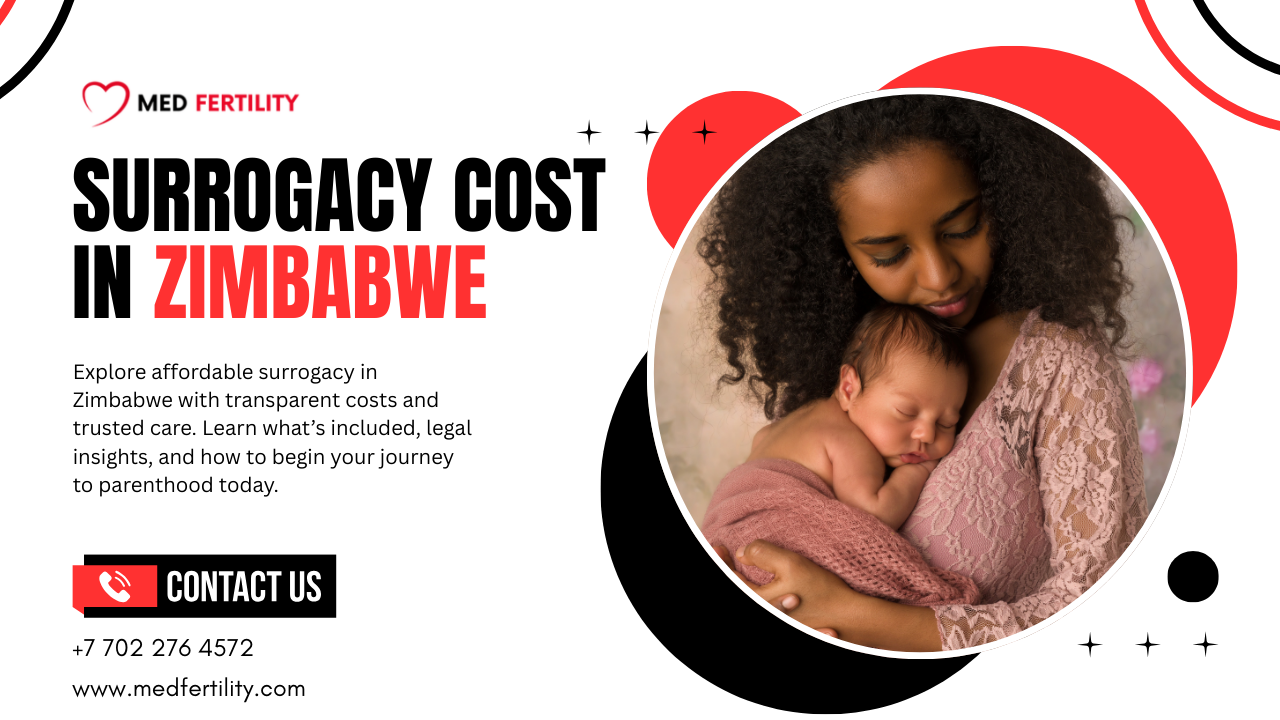‘Not being able to bear children’ is all blamed on women in marriage relationships, especially in African countries like Zimbabwe. There are many cases where male infertility could be the reason for not being able to carry the pregnancy. But blame only goes to women. Access to infertility treatments could help curb this lack of knowledge regarding infertility in human beings.
Infertility is a medical disease, WHO states this, and there is a dire need for access to basic infertility treatments in every possible country. One of those, surrogacy, is also a method to achieve the parenthood journey, an assisted reproductive method.
This article will help you gain real knowledge about the surrogacy procedure, its legal complexity, and its cost aspects for the Zimbabwean people.
What is Surrogacy in Zimbabwe?
Surrogacy is an ART tech and one of the most widely used infertility treatments. Surrogacy is a third-party reproduction method where a woman agrees to carry a child pregnancy in her womb. This arrangement usually helps the intended couple to have a child. In contrast, the woman is usually facing certain medical reasons or infertility issues, which hinder the success of conceiving the pregnancy, so what are those reasons why surrogacy is the only option for them?
(i) Pregnancy Risks: Some women are unable to carry a pregnancy in their bodies. Posing the pregnancy in her womb will result in life-threatening conditions for both mother & child.
(ii) Medical Issues: Some women face certain medical conditions where pregnancy is somewhat impossible due to reasons such as endometriosis, improper functionality of the uterus or absence of it, repeated miscarriages, cancer, age-related infertility, and other infertility reasons.
(iii) Unexplained Infertility: Although it’s rare, diagnostic testing couldn’t find the cause behind infertility. In that case, surrogacy is recommended.
All the surrogacy procedure is performed with the mandatory legal agreement to protect the rights & expectations of each party involved in the process. The agreement will be signed by both parties before proceeding with the actual medical process. This generally includes the outlines for the roles & responsibilities of each party, the provision of paying necessary compensation & medical insurance. It also states that the surrogate will have no rights over the child and will hand over the legal parentage rights to the intended couples.
Surrogacy arrangement is classified into two types: (i) Traditional Surrogacy and (ii) Gestational Surrogacy.
(i) Traditional Surrogacy
Traditional surrogacy is a form of surrogacy arrangement where the surrogate’s reproductive eggs are used to be fertilized with the help of the intended male partner’s sperm to form multiple embryos. These embryos will be placed back into the surrogate’s uterus. This is how surrogates will be impregnated in this form.
In this, usually, the surrogate will be playing the role of egg donor and pregnancy carrier, so she will share the biological relationship with the child. She will have some legal parental rights over the child, so, due to this reason, it is least preferred by the intended couples nowadays. Many surrogacy agencies discourage this due to the complexity of legal parental rights.
(ii) Gestational Surrogacy
Gestational Surrogacy is a form of surrogacy arrangement where the embryo formation takes place by using the reproductive eggs and sperm from both the intended partners. The formed embryos will be placed into the surrogate’s uterus for pregnancy conceiving.
In this case, if required, the couples also opt for donor eggs/sperm from an anonymous donor, but it couldn’t be from the surrogate.
In this case, the surrogate will be the only pregnancy carrier and will not share any biological relationship with the child. She will have to transfer parental rights right after the birth of the child. Due to these reasons, it is the most preferred surrogacy arrangement among the intended couples.
So, before making a final decision, you need to better understand the surrogacy laws in your country.

Legal Framework for Surrogacy in Zimbabwe
As of the current time, surrogacy laws or regulations are absent in Zimbabwe. In the current legal framework, it is not prohibited, nor regulated, and even not criminalized. It means that opting for surrogacy in Zimbabwe, the activity will be considered under the ‘grey area’.
However, there are certain mentions & that follow the principle of ‘child best interests’ in this case, which states that during the encounter through such surrogacy cases in the country, the court will rule based on the child’s best interests. This legal vacuum has sometimes put the intended couple and surrogate under legal risk, and it will be until the presence of proper regulations over surrogacy.
It would be advised to seek a consultation or proper legal guidance with a law professional or attorneys who have expertise regarding the Assisted Reproductive field or family before starting the actual surrogacy procedure in your country.
Let’s Discuss the Whole Surrogacy Journey in Zimbabwe
Not everyone is allowed to have a surrogacy treatment method. You need to have certain infertility & medical reasons, and it is mandated to be recommended by only recognized infertility experts/doctors.
For that, you’ll have to undergo various medical diagnostic tests, examinations, or screenings to get a comprehensive report on your reproductive health. Your fertility doctor will evaluate all reports, and if all conditions are met, then you will be recommended for surrogacy. A personalized treatment plan will be proposed, with full consultations with you.
You need to approach a good surrogacy agency that helps you to find a suitable surrogate match, all based on given preferences. Be patient, as this will take some time. The final selected surrogate will have to go through rigorous medical checkups & examinations. A psychological evaluation test will be conducted to ensure her fitness- physically & Psychologically.
For the intended female partner, the process starts with the ovulation induction or hyperstimulation process, which is very controlled. Here, the stimulating hormone injections/medications will be prescribed to stimulate multiple eggs for retrieval. Regular monitoring will be done through the ultrasound procedure. With the help of a small surgical method, the eggs will be retrieved from the ovaries/follicles.
On the same day, the sperm sample will also be collected from the male. He will be asked to masturbate in a separate medical room, ejaculate the semen, and collect it in the sample box. It will be carefully analyzed by the embryologists and prepared for the fertilization process.
The fertilization process starts with keeping together both reproductive gametes, i.e., eggs & sperm, in the same petri dish in the laboratory. This method is called the IVF method or artificial insemination method. This way leads to the formation of multiple embryos, developed until the blastocyst stage, which will be carefully analyzed before selecting for the implantation process.
In some cases, IVF is paired with other ART methods such as ICSI, IUI, etc. In the case of low sperm infertility, then ICSI is used to fertilize by inserting a single sperm directly into the egg shells, which leads to successful fertilization.
The implantation process begins with another surgical method. A small catheter that carries the embryos is inserted into the surrogate’s uterus and then released. To create a favorable environment for successful implantation, the surrogate will be prescribed certain hormonal medications. After 1-2 weeks, she will have an appointment with the expert for pregnancy confirmation, and a blood test will be conducted.
After the pregnancy confirmation, she will undergo complete pregnancy care. The surrogate will have a monthly allowance (or all at once after the birth) for food, nutrition, and a surrogate house (if provided). At the right maturation of 9 months, she will deliver the child and hand it over to the intended parents. The final legal procedure/documentation will be done for the transfer of legal parental rights to the intended couples and will have the birth certification process completed. That’s how the whole journey will be completed.
It would be advised for a better understanding of the surrogacy cost and make an understanding of the full surrogacy procedure.

So, what will be the Surrogacy Cost in Zimbabwe?
Due to the lack no regulations regarding surrogacy, it would be possible that it will be difficult to find a dedicated surrogacy agency/clinic in the country. However, many fertility centers have understood infertility among people and have started to provide treatment services such as IVF, ICSI, IUI, etc. However, if anyone wants to opt for a surrogacy procedure, we will provide the estimated cost range in order to better manage or budget this.
The average surrogacy cost would range between $15,000 and $25,000. However, this estimated cost range is solely based on the current cost range for IVF treatments in the country, which usually ranges between $3,500 and $6,000.
It is important to note that the overall surrogacy cost has several components. Here is the list of cost components:
- Surrogate compensation (ranges from $6,000 – $12,000): This is the most important cost component and could vary from one to another. The compensation would include all the medical procedures, her medical insurance, all costs incurred during prenatal (pregnancy) care & delivery charges.
- IVF Procedure Cost (ranges from $3,500 – $6,000): This is the other highest cost in the overall charges. This can be in multiple attempts, and each cycle will be charged on a separate basis.
- The Legal Procedure & Agreement ( ranges from $2,500 – $4,000): This cost includes the cost for all legal procedures, court approvals, written documentation, contract drafting, and parental rights transfer.
- Fee Charges by Agency/Clinics (ranges from $3,000 – $5,000): This cost is incurred for the administrative role, procedure monitoring, availability of required fertility expats & infrastructure, finding & matching suitable surrogates, providing legal guidance & support, etc.
- Support of Additional ART techs (ranges from $8,000 – $10,000): This is the cost charged for the use of any additional ART techs such as IVF, ICSI, Genetic testing, donor eggs, cryopreservations of egg/sperm/embryo, etc. These costs will be based on the requirements of these ART techs.
However, Many Factors Affect the Total Surrogacy Cost
Factors such as the type of surrogacy opted, the reputation of the agency/clinic, infertility experts’ experience, regulations & laws for legal procedures & requirement of strong legal professionals, and the region or city in Zimbabwe, etc are the factors that could affect the cost components prices and on the overall surrogacy cost in Zimbabwe.

Why Med Fertility Center Zimbabwe Could Be Your Best & Affordable Choice for Surrogacy?
Med Fertility Center Zimbabwe is one of the leading IVF & surrogacy centers in the country. The center has the mission to provide compassionate & comprehensive Reproductive Care. The center can complete its mission with the advanced medical infrastructure (state-of-the-art) & infertility experts. The center wants to remove the obstacles of infertility from your life to achieve the dream of parenthood.
Here’s why you should trust us for your infertility treatments, especially for IVF & Surrogacy:
- We have over 30 years in the infertility treatment field.
- We carefully understand the needs of the potential couples to provide an excellent medically customized plan.
- We have the compassion to blend cutting-edge medical science with compassionate care & solution care.
- We have provided guidance to over 2,500 successful IVF pregnancies.
- We also understand that ‘love is for everyone’; that’s why we offer surrogacy & IVF to the LGBTQ community.
We facilitate the proper guidance throughout the journey for you to create the family you have envisioned. Reach out to our website to learn more: https://medfertility.com/.
Ready to book a free consultation with us? Call us here, +254 701 669315, or email your query to info@medfertility.com
Final Thoughts
Infertility should not be a taboo topic, and it should be understood that it could be faced by both men and women. It is better to seek proper guidance from an infertility expert rather than to blame each other.
Surrogacy is proven to be an effective method to have your child even after facing infertility. Access to the right fertility centers or experts could help you get the right assistance regarding the procedure. Start taking steps, have proper discussions with your partner, and seek proper financial assistance for the surrogacy cost in Zimbabwe.
FAQs
Why do Some Women Choose to Become Gestational Surrogate Mothers?
However, there can be cases where surrogate mothers are doing this to earn some extra money by carrying a child for others. But it is also true that in most countries, surrogate mothers have the intent to help other women to have a child so that they can achieve their parenthood journey.
What are Infertility Reasons to have Surrogacy?
There are many reasons why a woman isn’t able to carry a pregnancy by herself, such as early Menopause, Endometriosis,
How Long Does Surrogacy Take Time?
Surrogacy is a very complex procedure, and it requires you to be emotionally & financially invested in the whole procedure. Finding a suitable surrogate to bring your baby back home takes around 18 to 36 months. You need to plan your work, home, and frequent visits to your fertility doctor.
Being a Surrogate, How Can I Prepare Myself for the Separation After the Baby’s Birth?
It is natural to have concerns, or there could be an emotional bond between the pre-born child and you. It is a very common procedure as you cannot keep a baby that is not yours, and it is a very normal procedure to separate after the birth of the child as per the legal agreement. You just have to make realistic expectations, and if you need to talk to your surrogacy agency, then get help from them.











